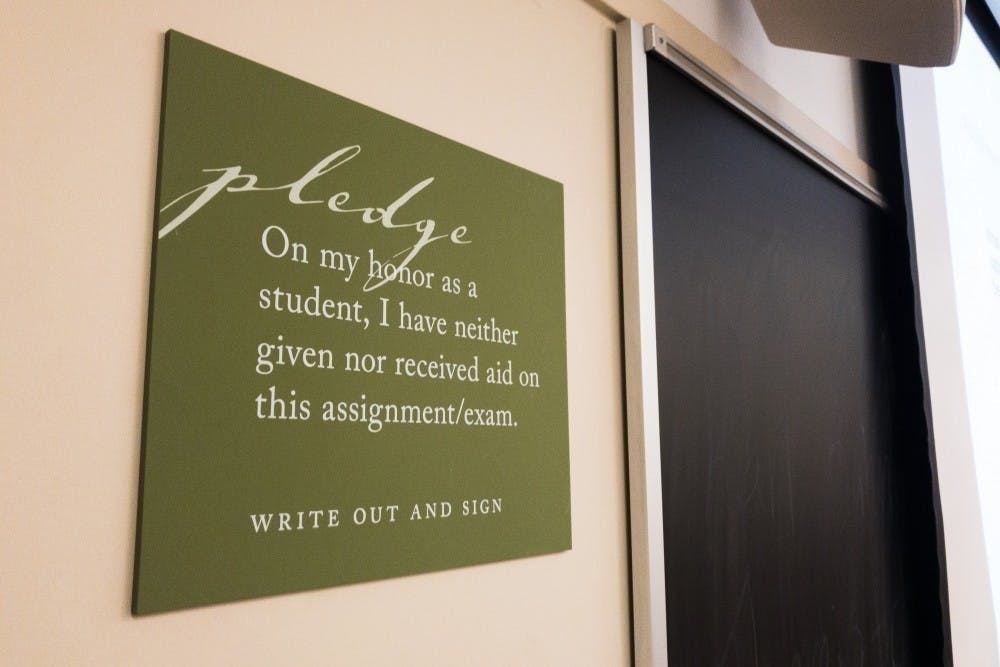After operating with almost entirely virtual procedures during the fall semester, the University Judiciary Committee and Honor Committee chairs expressed their satisfaction with their committees’ move to an online format, noting that while the process was initially daunting for both committee executive boards and members, collaborative student efforts have allowed for a smooth transition. Both chairs said that procedures will likely remain relatively unchanged next semester.
Each committee’s shift to online operations came in response to the University’s COVID-19 restrictions on in-person gatherings. The UJC and Honor Committee Executive Boards were primarily responsible for crafting the format of and coordinating their respective committees’ online procedures. Gabby Cox, fourth-year Batten student and chair of UJC, said that members of UJC have addressed the semester’s challenges effectively.
“I’m really proud of us,” Cox said. “We did a good job adapting to these circumstances by transitioning a lot of our procedures to online trials. We put in a lot of time and effort over the summer trying to switch our procedure to mostly online — I think it paid off.”
UJC used Microsoft Teams to upload and share case information with student committee members involved in given cases, and used Zoom for both committee meetings and the majority of student hearings. Students were given the option of an in-person trial or a virtual one.
“There is always the possibility of small technical difficulties, but in terms of online platforms, student accessibility, and availability of privacy settings, Zoom was the most feasible option,” Cox said.
UJC has seen a significant influx of cases this semester and an increase in the number of students breaking University policy, but Cox said that the committee's adapted system has allowed for efficiency in processing this influx of cases.
According to its Fall 2020 Infographic, UJC adjudicated 23 cases this semester involving 61 students and two student organizations. Nine of the cases — involving 43 students — were related to the University’s COVID-19 policies.
Comparatively, UJC adjudicated 33 cases involving 61 students and two student organizations from April 2018 to April 2019.
Essay writing was the most common sanction administered by UJC this semester and the committee did not suspend or expel any students. However, 29 students involved in five cases are in abeyance for suspension and two students involved in two cases are in abeyance for expulsion, meaning if they return to UJC for another violation, the sanction may be enacted.
With regards to next semester, Cox does not believe the UJC will make many changes to its procedures.
Cox also added that she hopes students will continue to abide by University regulations — like masking and maintaining a six-foot distance during in-person gatherings — meant to limit the spread of COVID-19, in the interest of public health and safety.
“At the end of the day, this is extremely serious and we need to not be selfish and look out for other people, their safety and their health,” Cox said. “These [rules] exist to keep yourself safe and other people safe.”
Ryan Keane, a fourth-year Batten student and Honor Committee chair, said that similar to UJC, Honor has adapted well to the shift to virtual operations. Keane said that despite initial concerns the committee had about ensuring confidentiality and efficiency in a virtual hearing process, members were able to develop an effective new system for the semester.
“On the whole, I’m really happy with what we were able to come up with and the way everything went,” Keane said. “I think at this point we’re all comfortable with the process we have.”
Overall, Keane thinks the system the Honor Committee has pursued this semester in terms of case proceedings will remain relatively unchanged next semester. He did, however, note that the committee may see some internal changes next semester in terms of revamping the social and community aspects of the Honor Committee.
“I think the biggest issue has just been people not knowing each other,” Keane said. “We didn’t have our committee retreat like we normally do because of COVID.”
Keane said that starting next semester, Honor may plan small in-person gatherings and committee meetings that will allow members to build relationships within the committee.
Although Keane was unable to reveal whether or not the Honor Committee has seen an increase in its caseload this semester due to Honor system confidentiality, he did say that concerns about cheating were definitely heightened this semester.
“Professors and students alike are very concerned, and I’d say, legitimately so, that there’s more cheating going on because of the online format,” Keane said. He added that it is important that students continue to uphold the principles of the Honor Code.
“Honor is still here,” Keane said. “The whole philosophy behind Honor is that, in a situation like this, when it is admittedly so easy to cheat, we as U.Va. students will stay true to who we are and say, ‘No, I’m not going to succumb to that temptation.’ That’s what Honor is to me and I think that’s what Honor should be to all of us.”







